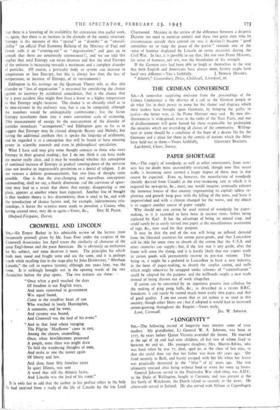CROMWELL AND LINCOLN Sia,—Sir Ernest Barker in his admirable review
of the lecture (now fortunately printed) given by Mr. Isaac Foot under the auspices of the Cromwell Association last April traces the similarity of character of the great Englishman and the great American. He is obviously an enthusiast for his subject, and none deserves it more. The principles for which both men stood and fought were and are the same, and it is perhaps worth while recalling that in the stage play by John Drinkwater, "Abraham Lincoln," the call to repress tyranny, although 200 years later, was the same. It is strikingly brought out in the opening words of the two chroniclers before the play opens. The two extracts are these: "Once when a peril touched the days Of freedom in our English ways, And none renowned in government Was equal found, Came to the steadfast heart of one Who watched in lonely Huntingdon, A summons, and he went, And tyranny was bound, And Cromwell was the lord of his event."
And in that land where voyaging The Pilgrim ' Mayflower ' came to rest, Among the chosen, counselling, Once, when bewilderment possessed A people, none there was might draw To fold the wandering thoughts of men, And make as one the names again Of liberty and law.
And then, from fifty fameless years In quiet Illinois, was sent A word that still the Atlantic hears, And Lincoln was the lord of his event."
It is only fair to add that the author in his preface refers to the help had received from a study of the life of Lincoln by the late Lord Chamwood. Mention in the review of the difference between a despotic Dictator (no need to mentian names) and these two great men who by circumstances outside their control (or was it destiny?) became "good constables set to keep the peace of the parish" reminds one of the sense of humour displayed by Lincoln on many occasions during the -Civil War. In fact, it is possible to say that, like our own Prune Minister, his sense of humour, not wit, was the foundation of his strength. If the German race had been able to laugh at themselves in the way that both English and Americans have always done, history might have


























 Previous page
Previous page